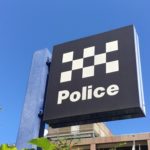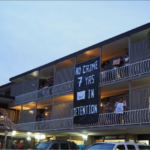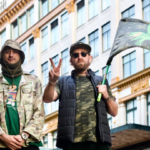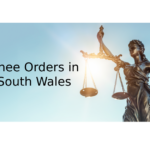Muslim Australians Increasingly Victimised
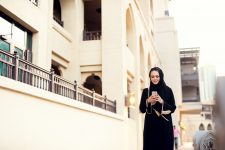
Australia is meant to be a multicultural, accepting and inclusive country, but recent events suggest that a minority of Australians are anything but welcoming of other cultures.
In the wake of a series of terrorist attacks perpetrated by violent extremists, the Australian Muslim community has experienced increased levels of racial profiling, vilification and abuse.
There has also been a surge in ‘anti-Islam groups,’ such as Reclaim Australia and the United Patriots Front, which have staged a series of protests inciting violence against the Muslim community.
Charity Group Targeted
On Saturday, Islamic charity group The White Coats was targeted by police and treated like a terrorist group while on the way to the Stereosonic Music Festival to warn young people about the dangers of taking drugs.
The White Coats are known for helping the less-fortunate, including Sydney’s homeless, by providing them with food and support. But the group’s van was pulled over in Lidcombe, surrounded by more than 100 police officers and searched by a SWAT team in a chaotic scene reminiscent of a full-scale terrorism raid.
The group is understandably shocked and disgusted by its treatment at the hands of law enforcement.
Islamaphobia
A recent study jointly conducted by Western Sydney University, the Islamic Sciences and Research Academy Australia and Charles Sturt University has found that Muslims who reside in Sydney are three times more likely than their non-Muslim peers to experience racism in the community.
Study’s Shocking Findings
The study involved the survey of 600 Sydney Muslims about their experiences in Australia, as well as their views and attitudes about various social issues.
Around two-thirds of respondents reported experiencing racism at some point during their time in Australia; and most disturbingly, one in ten reported these incidents as occurring ‘often or very often.’
34-year-old international aid worker Asma Fahmi shared her experience of being physically assaulted on the way to work simply because of her racial background:
‘I was on my way to work, on the phone talking to a friend, when I felt something push me from behind … I didn’t really know what was happening and a man was shouting at me, ‘f–king terrorist.. It was one of those situations where you couldn’t see coming. He pretty much attacked me from behind. He was so enraged he was spitting.”
Sadly, Ms Fahmi says that this experience is the norm, and that ‘hearing stories like this is something we have unfortunately become accustomed to as a community.’
On the flip side, the responses to the survey dispelled many of the misconceptions about Muslim people, with researchers finding ‘little evidence of widespread alienation among Australian Muslims,’ and even finding that a closer affiliation with the Muslim religion were ‘positively associated with national belonging and a sense of Muslim integration.’
Most respondents said that education and employment were the most pressing issues to them. They voiced a sense of belonging to Australia, associated with non-Muslims and stated that Islam was consistent with Australian norms. Furthermore, 97% believed that it was a good thing for society to be composed of people from different cultures – compared to a national average of 87%.
Western Sydney University researcher, Professor Kevin Dunn, says that this shows that,
‘counter to what people might mistakenly believe from media coverage and a lot of debate and commentary, the vast majority of Muslims are very ordinary Australians.’
Criminal Charges for Racial Abuse
While the racial vilification of the Muslim population is rife in Australia, there are potential consequences for those who express racial abuse and incite violence against people based upon their race, religion or ethnicity.
Section 4 of the Summary Offences Act makes it an offence to engage in offensive conduct, prescribing a maximum penalty of 3 months imprisonment and/or a $660 fine. Section 4A makes it an offence to use offensive language in, near or within hearing distance of a public place or school. The maximum penalty for that offence is a $660 fine or up to 100 hours community service.
In determining whether an offence has taken place, the court will ask whether a ‘reasonable person’ would consider the conduct or language to be offensive.
In addition, section 18C of the Racial Discrimination Act 1975 states that it is unlawful to publicly engage in conduct that is:
- Reasonably likely, in all the circumstances, to offend, insult, humiliate or intimidate another person or a group of people; and
- Done because of the race, colour or national or ethnic origin of the other person or of some or all of the people in the group.
Section 20D of the Anti Discrimination Act contains provisions against ‘serious racial vilification’, stating that:
A person shall not, by a public act, incite hatred towards, serious contempt for, or severe ridicule of, a person or group of persons on the ground of the race of the person or members of the group by means which include:
(a) Threatening physical harm towards, or towards any property of, the person or group of persons, or
(b) Inciting others to threaten physical harm towards, or towards any property of, the person or group of persons.
The maximum penalty is 6 months imprisonment and/or a fine of up to $5,500 for individuals, and $11,000 for corporations.
As discussed in one of our previous blogs, Attorney-General Gabrielle Upton has proposed a reform of this section in coming months to make it easier to prosecute offenders.
Furthermore, Section 80.2A of the Commonwealth Criminal Code Act 1995 contains the offence of ‘urging violence against groups.’ A person is guilty of an offence under that section if they:
- Intentionally urge another person or group to use force or violence against a ‘targeted group’;
- They do so with the intention that force or violence will occur;
- The targeted group is distinguished by race, religion, nationality, national or ethnic origin or political opinion; and
- The use of the force or violence would threaten the peace, order and good government of the Commonwealth.
The maximum penalty is 7 years imprisonment.
But despite the breadth of these laws – and the fact that offences are blatantly being committed at ‘anti Muslim rallies’ and on social media – police rarely prosecute the offenders, even ‘high fiving’ members of Reclaim Australia during a rally. The unwillingness to prosecute means that Australian Muslims continue to experience harassment, vilification and abuse while extremist groups like Reclaim Australia and the United Patriots Front gather momentum and do essentially as they please.



